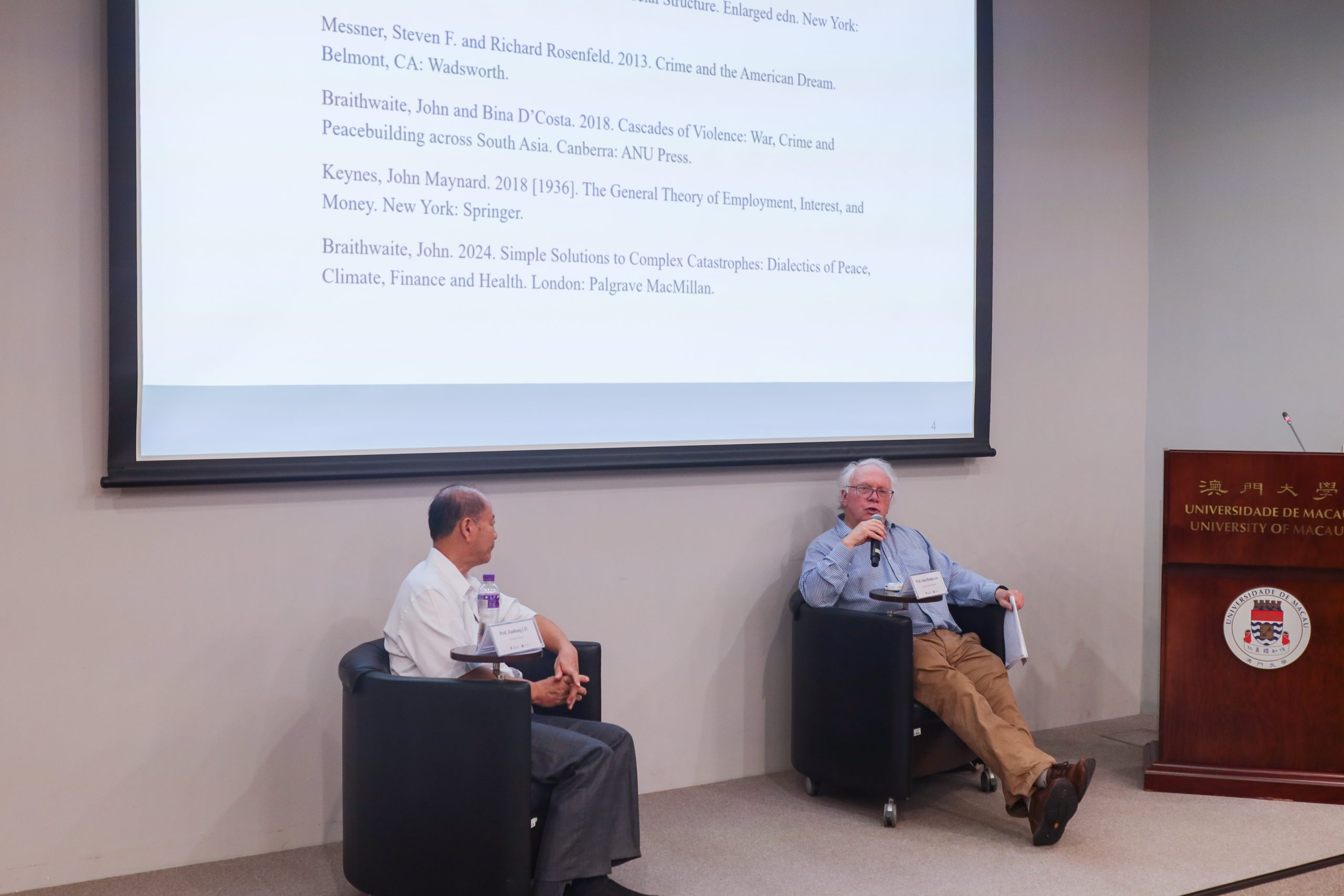【IAS】Distinguished Guest Lecture Series “New and Old Macrocriminologies” was successfully held
【高研院】特邀嘉賓講座 "新舊宏觀犯罪學"圓滿舉行

Lecture on “New and Old Macrocriminologies”, organized by the Institute of Advanced Studies in Humanities and Social Sciences (IAS), was successfully held on 20 September 2024. This lecture featured Professor John Braithwaite from the Australian National University as the speaker and Professor Liu Jianhong, Distinguished Professor of the Faculty of Law, as the moderator.
In this lecture, Prof. Braithwaite highlighted the significance of revisiting macrocriminology within the context of modern criminology. He began by introducing the origins and evolution of macrocriminology, referencing early Marxist criminologists such as Durkheim and Robert K. Merton. He emphasized the relevance of these foundational theories, particularly in shaping contemporary understandings of institutional anomie and collective efficacy, concepts that gained traction in the 1990s. Prof. Braithwaite argued that these theoretical advancements provide a strong framework for envisioning a society where more freedom and less crime coexist.
Prof. Braithwaite also delved into the concept of relational justice, drawing on both Confucian and Marxist traditions. He noted that a relational approach encourages community involvement and care in addressing crime, emphasizing that love and understanding must be integral to the justice process, particularly at the local level. Additionally, Prof. Braithwaite explored the relationship between inequality and crime, drawing from classical theorists such as Aristotle, who emphasized that both excess and poverty lead to crime. He argued that unequal societies suffer from higher crime rates, both among the powerless, who are exploited, and the powerful, who exploit others. His work suggests that while eliminating inequality may be impossible, societies can and must strive to reduce it in order to decrease crime. He emphasized that future criminology must embrace not only traditional legal structures but also broader social and cultural dimensions, particularly as global trends move toward decentralization and individual freedoms.
In the discussion session, topics such as the reliability of artificial intelligence in predicting recidivism and the effectiveness of mediators in restorative justice were explored. Prof. Braithwaite expressed concerns about the potential for artificial intelligence to stigmatize offenders, emphasizing the need for a balanced approach that combines technology with human judgment. He also highlighted the importance of well-trained mediators and community support, noting that these elements are crucial for creating a more inclusive and fair restorative justice process. His perspective underscored the value of integrating technology while maintaining a strong focus on human involvement in the justice system.
In the afternoon, IAS organized a tea break activity with Prof. John Braithwaite and Prof. Valerie Braithwaite, which attracted students and faculty members from various disciplines. During this activity, Prof. Yu Xingzhong, as the host, helped create a relaxed atmosphere where students and faculty members extended the lecture content for more in-depth discussions. The interaction encouraged active reflection and enhanced the impact of the lecture. The activities attracted students and faculty members from various disciplines, and the audience exhibited great enthusiasm and active participation throughout the event.
由人文社科高等研究院(IAS)舉辦的主題為“新舊宏觀犯罪學”的講座於2024年9月20日順利舉行。此次講座的主講人是澳洲國立大學的約翰·布朗懷特(John Braithwaite)教授,由法學院劉建宏特聘教授擔任主持人。
在此次講座中,布朗懷特教授強調了在現代犯罪學背景下重新審視宏觀犯罪學的重要性。他首先介紹了宏觀犯罪學的起源及演變,並參考了涂尓干(Durkheim)和羅伯特·金·默頓(Robert K. Merton)等早期馬克思主義犯罪學家。他特別強調了這些基礎理論在塑造當代對制度失范和集體效能理解中的重要性,這些概念在20世紀90年代獲得了廣泛關注。布朗懷特教授認為,這些理論發展為提倡更多自由和減少犯罪的社會設想提供了強有力的框架。
布朗懷特教授還借鑒了儒家思想和馬克思主義,深入研究了關係正義的概念。他指出,關係方法鼓勵社區參與和關懷解決犯罪問題,強調愛與理解是司法程序中不可或缺的一部分,尤其是在社區層面。此外,布朗懷特教授借鑒了亞里士多德等古典理論家的觀點,探討了不平等與犯罪之間的關係。理論家們都強調過度富裕和貧困都可能導致犯罪。他認為,不平等社會的犯罪率更高,因為其中既有被剝削的無權者,也有剝削他人的強者。他的研究表明,雖然消除不平等幾乎不可能,但社會有能力且必須努力減少不平等,從而減少犯罪。布朗懷特教授強調,隨著全球趨勢走向權力下放和個人自由,未來的犯罪學不僅需要涵蓋傳統法律結構,還必須涉及更廣泛的社會和文化層面。
在討論環節,大家探討了人工智能在預測累犯方面的可靠性,以及調解員在恢復性司法中的有效性等主題。布朗懷特教授對人工智能污名化罪犯的可能性表示擔憂,強調需要一種結合科技與人類判斷的平衡方法。他還強調了訓練有素的調解員和社區支持的重要性,並指出這些要素對於創建更具包容性和公平的恢復性司法程序至關重要。他的觀點強調了在整合科技的同時,仍需重視人類在司法系統中的參與。
下午,高研院為布朗懷特教授夫婦舉辦了茶歇活動,吸引了來自各學科的學生和教職人員參與。於興中教授作為茶歇活動的主持人,營造了輕鬆愉快的交流氛圍。活動期間,學生們主動積極地向布朗懷特教授請教,圍繞講座內容進行了深入的討論和交流。這次互動,不僅讓師生們進行了深入思考,也有助於提升講座的影響力。此次活動吸引了各學科的學生和教職人員參與,現場討論氣氛熱烈,大家積極投入其中。






